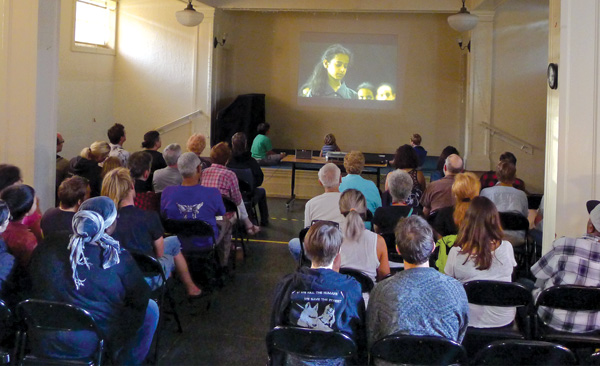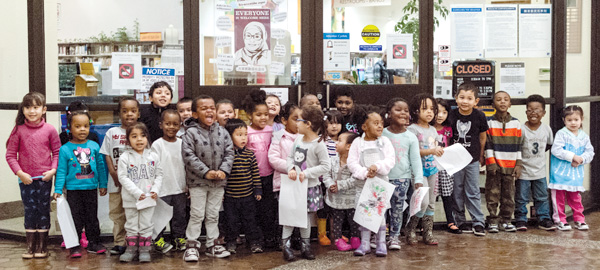Oakland Public Library Takes Action Against Islamophobia

A panel at OPL featuring (from left) Deepa Iyer;
moderator Sabiha Basrai of the Alliance of South Asians Taking
Action; and Zahra Billoo, executive director of California’s Council
on American-Islamic Relations. Below: A packed house watches the
award-winning film Wadjda at OPL’s Golden Gate Library.
Photos courtesy of Oakland Public Library
Also read:
Oakland Public Library (OPL) is a pretty special place to work. We are one of the most diverse cities in the country, and our library strives to reflect that diversity and cultivate equity. We are known for activism, art, and progressive politics. Yet our city—like hundreds of others nationwide—still grapples with Islamophobia and racism.
Last year, California saw a 50 percent spike in anti-Muslim hate crimes, as well as a staggering increase in racial violence overall. Even more troubling is the fact that most bias incidents are never reported.
This hit home for OPL when a Muslim student in our adult literacy program was verbally attacked outside the library. The woman says that harassment like this is routine for her and others—at the mall, on the train, or on the street. “My friends stay inside the house because they are scared,” she says. “But I always go back [to public places].”
While our libraries boast open doors and diverse collections, we began to ask: What more could we do?
We started with a visible message of inclusion and support. Shortly after this incident, we collaborated with local artist Micah Bazant to develop “Everyone Is Welcome Here,” a bold poster featuring a Muslim woman wearing a headscarf. Since early 2016, thousands of these have been distributed in print and online, giving businesses, libraries, and schools a clear way to stand against fear and hate.
One library branch turned the poster into a passive program, inviting patrons to translate its message into multiple languages. The display hangs behind the reference desk, visible to everyone who enters the building. Another branch hung the poster on its front doors. Meanwhile, our friends at Solano County Library used the poster as a centerpiece for an awesome book display.
Most important, Muslim patrons tell us that visible messages like these increase a sense of safety and reduce isolation.

A screening of 'Wadjda' at Oakland Public Library.
Building community
Oakland is also addressing Islamophobia by building cross-cultural bridges. In May 2016, the library partnered with the Islamic Cultural Center of Northern California to bring in civil rights attorney and author Deepa Iyer. Through stories and interviews, Iyer shows how talking about race and racial hierarchies is a vital step toward dismantling racism and Islamophobia.
The resulting dialogue on interracial solidarity, histories of discrimination, and community organizing in the post-9/11 climate moved participants to reflect and to act. We also used her Race Talk Toolbox for book clubs.
The event led to an ongoing partnership with the Islamic Center. As part of this new collaboration, our teen services department brought 150 students to the Islamic Center to meet Marina Budhos, author of the YA novel Watched, about a Muslim teen trapped into surveilling his own community. Students asked questions about Islam, the true-to-life themes in the book, and the current political moment. The event fell two weeks after Donald Trump’s inauguration. Teen librarian Brian Boies considered it “one of the most powerful programs” he’d ever participated in at the library.
For most students, it was the first time they’d visited a Muslim community center, even though it’s just a few blocks from their school. We decided to host all events at the Islamic Center for this reason. Breaking down this barrier has been a powerful step in building community and addressing misconceptions about Islam.

Translations of “Everyone Is Welcome
Here” in Vietnamese, Hebrew,
Polish, and other languages at
OPL’s Golden Gate branch.
An institutional framework
These programs and partnerships are matched by a deep commitment from OPL—at all levels—to create meaningful inclusion and equity-centered outcomes.
As part of this commitment, OPL fosters inclusion across all kinds of programs, not just events on race, politics, or religion. Children’s librarian Nichole Brown hosts an annual display to recognize Ramadan. Librarian Erica Siskind authored an OPL resource page (ow.ly/gzjj30f9osz) after an elementary school teacher asked for resources on welcoming Muslim students. Last month, branch manager Erin Sanders hosted a teen event on the comic Super Sikh and a screening of the award-winning film Wadjda for our Women Bike Book Club.
On an institutional level, OPL is committed to hiring diverse staff, which includes several Muslim women who choose to wear headscarves. When patrons see themselves reflected in the staff, they know—more than just being told—that they are welcome. Staff diversity also enables us to learn more from one another. For Muslim staff, this institutional commitment to staff diversity translates into knowing that you will be safe and supported at work.
OPL is also creating an environment to confront bias by working with the Government Alliance on Race and Equity and prioritizing professional development. In January 2017, employees attended a multiday training for Touchpoints in Libraries, a strengths-based framework equipping library staff to better support families. While not a formal diversity training, Touchpoints encourages staff to confront the implicit biases we bring to interactions with our patrons. For example, Touchpoints generated staff reflection about how personal experiences and values about women’s bodies and dress can influence interactions with Muslim women who choose to wear niqabs (face veils).
Through Touchpoints and a recent training based on the film Cracking the Codes: The System of Racial Inequity, OPL staff are learning to advance equity and practice cultural humility, to reflect and analyze causes of suffering, and to foster a more inclusive worldview.
We have opened ourselves up to difficult conversations and proved they are worth having. In doing so, we reach more people and deepen dialogue. Library staff are better equipped to listen, partner, and lead community change.
We know there is more we can do. How are you working to end racial and religious intolerance in your community?

Children gather by Bazant’s poster at OPL’s Eastmont branch.
RELATED
The job outlook in 2030: Librarians will be in demand
The job outlook in 2030: Librarians will be in demand
ALREADY A SUBSCRIBER? LOG IN
We are currently offering this content for free. Sign up now to activate your personal profile, where you can save articles for future viewing






Add Comment :-
Be the first reader to comment.
Comment Policy:
Comment should not be empty !!!